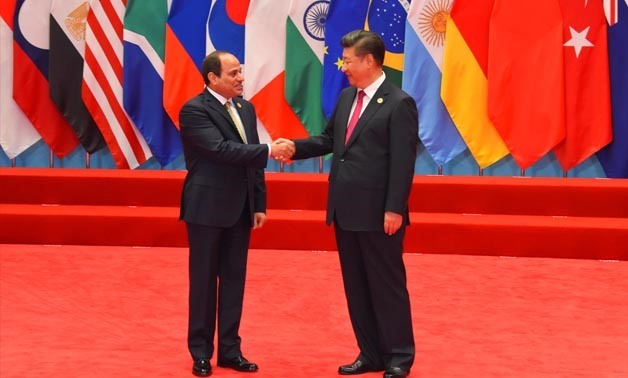
President Abdel Fatah al Sisi (L) and Chinese President Xi Jinping (R) during the G20 Summit meetings in Hangzhou, China on September 4, 2016- Press Photo
CAIRO- 1 September 2017: President Abdel Fatah al-Sisi will head to the Chinese city of Xiamen on Sunday to attend the ninth summit of the BRICS block upon an invitation for Egypt, among other five non-members states, to attend the summit.
During the summit, held from September 3-5, Sisi hopes to develop economic potentials with the bloc, which includes Brazil, Russia, India, China and South Africa.
He said in an official statement that he expects the summit to contribute to further understanding of political, economic and social challenges facing developing countries.
China has always been a key economic partner for Egypt over the past four years. In late 2013, Chinese Vice President, Li Yuanchao, announced giving Egypt a non-refundable grant of $24.7 million.
In December 2014, Sisi signed a comprehensive strategic partnership agreement with his Chinese counterpart Xi Jinping, including three cooperation agreements in the fields of economy and technical cooperation. Sisi and Jinping exchanged several visits since that time.
Egypt ranked 52nd in list of China's largest trading partners in 2016, according to the latest statistics released by the Chinese General Administration of Customs.
Economic relations between Cairo and Beijing are deemed strong. The volume of trade exchange between Egypt and China recorded $5.178 billion from January to June 2017.
China's exports to Egypt decreased by 20.79 percent on a year-on-year basis to $4.518 billion, while Chinese imports from Egypt increased by 298.37 percent to reach $660 million.
Bilateral trade between Egypt and China is expected to further grow as Egypt has officially joined in 2015 the Silk Road Economic Belt trade union, which encompasses 92 Chinese and foreign associations.
The Silk Road network was launched by China in 2013 to promote globalized cooperation and development. It includes the countries that the Silk Road goes through across the three continents of Asia, Africa, and Europe.
The ratification of the New Investment Law in Egypt in mid-2017 has encouraged Chinese investors to launch projects in Egypt.
In a press conference this week, Chinese Ambassador to Egypt, Song Aiguo, said that several Chinese companies are looking for investment opportunities in Egypt, especially in the New Administrative Capital.
Investments of Chinese companies in Egypt reached a total of $6.8 billion, most of which had entered in the last five years, Aiguo said, adding that Chinese firms are interested in building public facilities and industrial parks.
In the same week, Minister of International Cooperation and Investment, Sahar Nasr, signed an agreement with the Export–Import Bank of China (China Exim Bank) to cooperate in financing national and development projects over the next three years.
On the tourism front, the number of Chinese tourists visiting Egypt increased by 94 percent during 2017, compared to the same period last year, according to China’s Xinhua News Agency.


Comments
Leave a Comment